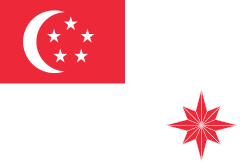Changi Naval Base
Changi Naval Base (CNB), officially known as RSS Singapura - Changi Naval Base,[2] is a naval base of the Republic of Singapore Navy (RSN). Located about 1.5 kilometres east of Changi Air Base (East) and 3.5 kilometres east of Singapore Changi Airport, the base was built on 1.28 km² (0.50 sq mi) of reclaimed land. It was officially opened on 21 May 2004 by the then Prime Minister of Singapore, Goh Chok Tong. A Navy Museum was opened at the entrance of the base in 2012.[3]
| Changi Naval Base | |
|---|---|
RSS Singapura - Changi Naval Base | |
| Changi Near Changi Bay in Singapore | |
 Singapore and United States warships at Changi Naval Base in 2015 | |

| |
.svg.png) Changi Naval Base | |
| Coordinates | 1°19′16″N 104°01′33″E |
| Type | Naval base |
| Area | 86 ha (0.86 km2) |
| Site information | |
| Owner | |
| Controlled by | |
| Open to the public | Yes (limited) |
| Website | mindef.gov.sg |
| Site history | |
| Built | 2004 |
| Garrison information | |
| Garrison | 171 Squadron[1] |
| Occupants | Force Generation Squadron |
Overview

Its 6.2 km (3.9 mi) berthing space can accommodate an aircraft carrier[4] and is often used by visiting ships of the Royal Navy as part of the Five Power Defence Arrangements and United States Navy (USN), as a result of the signing of the addendum to the 1990 United States-Singapore Memorandum of Understanding on 10 November 1990, which formalised arrangements for USN ships to use CNB facilities.[5] Also, India and Singapore signed a bilateral agreement that will allow Indian Navy ships limited logistical support, including refuelling, at CNB.[6]
The Straits Times stated in an editorial that:
The US Navy uses Singapore's naval facilities for logistics and re-supply, while Singapore uses American airbases and abundant space for ground training.[7]
Design
| Republic of Singapore Navy |
|---|
 |
| Formations |
| Ships |
| List of ships of the Republic of Singapore Navy |
| Bases |
Automation was incorporated into the design of CNB to reduce manpower requirements. It has an automated underground ammunition depot that allows ammunition to be loaded onto the ships and an automated warehouse system to store items. The base has a fibre-optic broadband network for information management. The base was also designed to be environment-friendly, with three small-scale wind turbines powering the 50 lights along the breakwaters at night. Conventional roof construction materials were substituted by 72 thin-film solar panels and the solar energy generated lights 100 downlights in the base. Seawater is used in the air-conditioning system,[8] saving about 35,000 m³ (equivalent to 20 Olympic-sized pools) of potable water annually.[9]
Deployment
Currently, aircraft carriers, submarines, frigates, amphibious transport docks and missile gunboats are based at CNB. Co-located in CNB is the Changi Naval Training Base, also known as RSS Panglima - named in honour of the first ship of the navy.[10][11]
References
- "Our Squadrons". www.mindef.gov.sg. Archived from the original on 25 September 2018. Retrieved 10 March 2019.
- Lim, Adrian (10 February 2017). "Changi Naval Base to get new name: RSS Singapura - Changi Naval Base". The Straits Times. Archived from the original on 20 July 2018. Retrieved 10 March 2019.
- "Navy Museum - Home". www.mindef.gov.sg. Retrieved 10 March 2019.
- "Our Bases". Republic of Singapore Navy. Archived from the original on 8 February 2005. Retrieved 4 March 2005.
- "Transcript: Cohen/Tan press briefing on US-Singapore relations". USIS Washington File. Archived from the original on 26 April 2005. Retrieved 7 May 2005.
- Gurung, Shaurya Karanbir (30 November 2017). "Navy gets access to Singapore's Changi naval base". Archived from the original on 6 December 2017. Retrieved 6 December 2017 – via The Economic Times.
- The Straits Times (in print) editorial on November 23, 2009. http://www.straitstimes.com/Home.html Archived 29 July 2012 at the Wayback Machine
- "DSTA developed innovative solutions at Changi Naval Base". DSTA. Archived from the original on 6 October 2007. Retrieved 7 May 2005.
- "DSTA gives Changi Naval Base a 'green' edge". DSTA. Archived from the original on 28 May 2006. Retrieved 7 May 2005.
- "1956 - Serving with pride: The RSS Panglima". MINDEF. Archived from the original on 4 August 2012. Retrieved 13 March 2019.
- "2004 - Changi Naval Base". MINDEF.